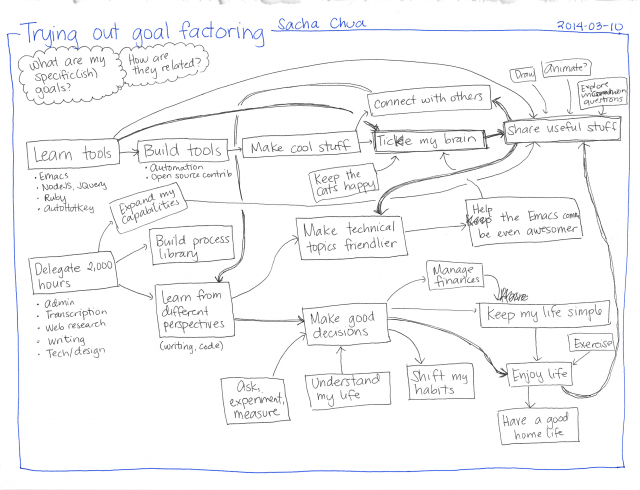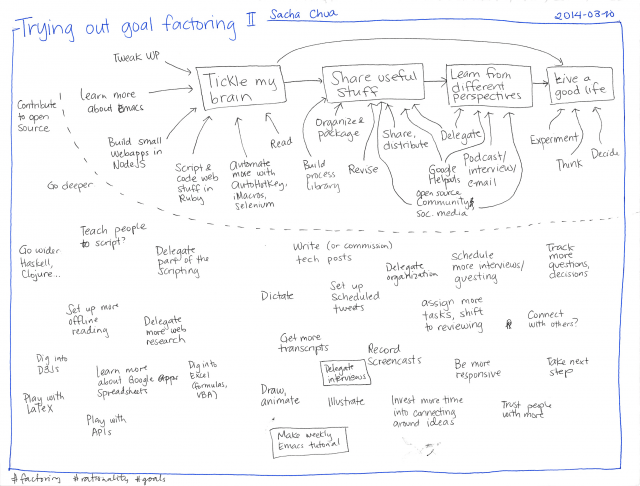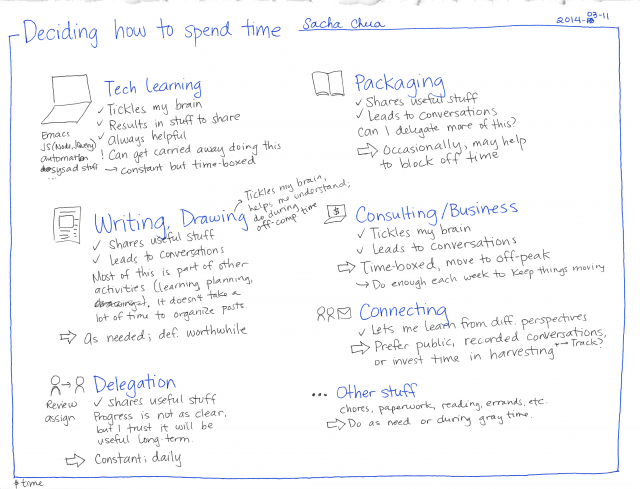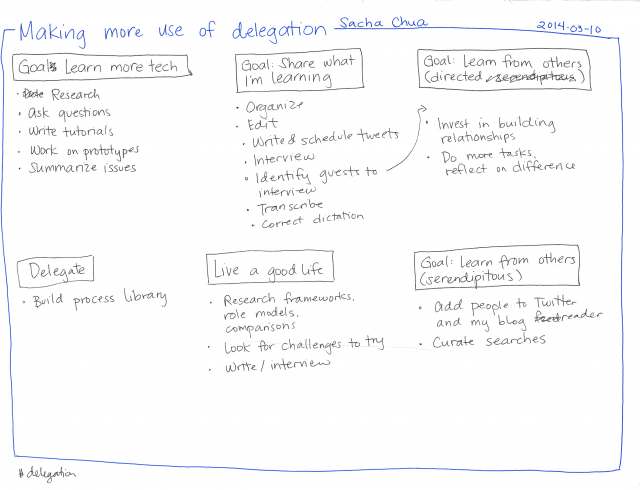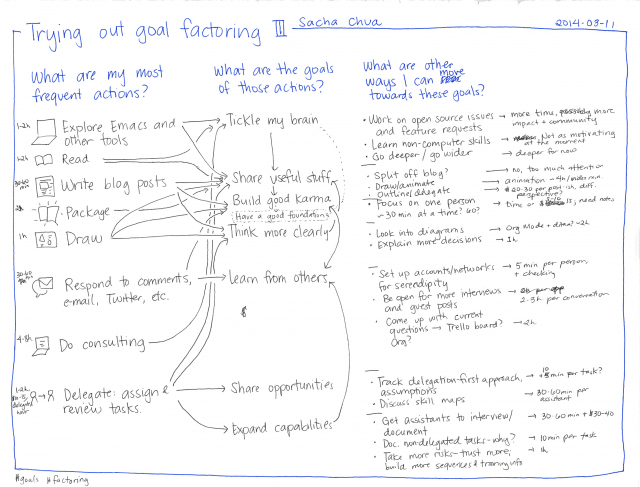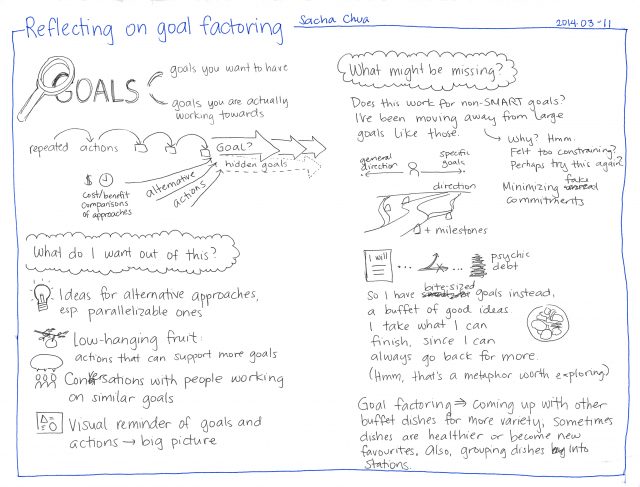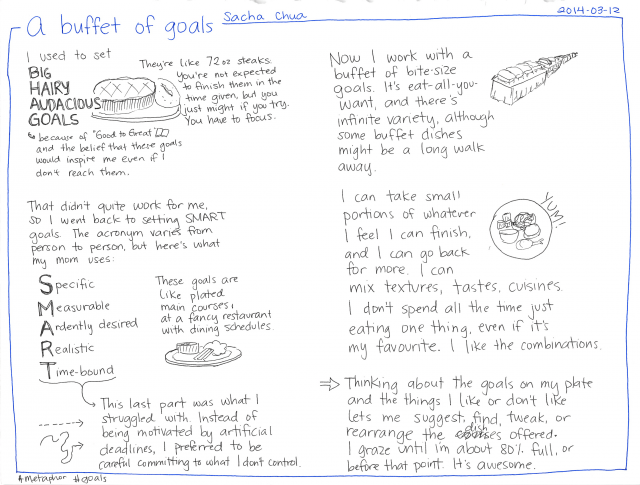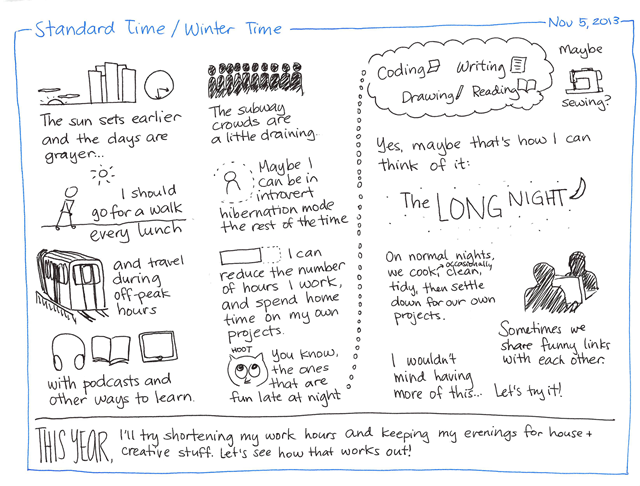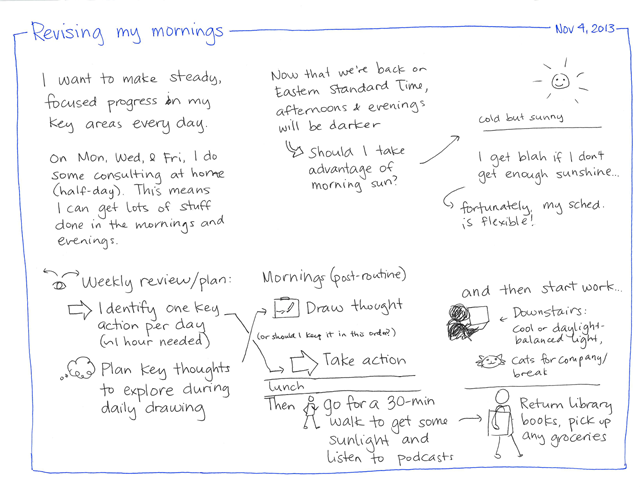Thinking about what I want to do with my time
Posted: - Modified: | decision, experiment, planning, timeEvery so often, I spend time thinking about what I want to focus on. I'm interested in many things. I like following my interests. Guiding them to focus on two or three key areas helps me avoid feeling split apart or frazzled.
I balance this thinking with the time I spend actually doing things. It's easy to spend so much time thinking about what you want to do that you don't end up doing it. It's easy to spend so much time doing things that you don't end up asking if you're doing the right things. I probably spend slightly more time on the thinking side than I could, but that will work itself out over time.
I balance thinking with moving forward. It doesn't matter if I might be going in the wrong direction, because movement itself teaches you something. You discover your preferences: more of this, less of that. You get feedback from the world. For me, moving forward involves learning more about technology, trying experiments, making things, and so on. Taking small steps helps me avoid spending lots of time going in the wrong direction.
(And are there really wrong directions, or just vectors that don't line up as well?)
What do I want to do with my time?
Fitness: The weather's warming up, so: more biking, more raking, more compost-turning, more carrying water to the garden. It would be good to be fitter and to feel fitter. I like the focus on fitness rather than exercise – not exertion for its own sake, but practical application.
Coding: I like coding. Coding might be a perfectly acceptable answer to the question “What do I want to do with my life?”, at least currently. I've been doing a lot more Emacs coding, and I'm digging into other technologies as well. I like it because I can build stuff – and more importantly, learning helps me imagine useful stuff to build.
I think I want to get better at making web tools that are useful and that look good, but I'm not sure. Lots of other people can do this, and I haven't come up with strong ideas that need this. (Back to the need for a well-trained imagination!) I can wait to develop this skill until I have a stronger idea, or I can learn these skills to lay the foundation for coming up with ideas. I've been thinking about getting better at working with APIs, but that's even more like digital sharecropping than creating content on other people's platform is. APIs, pricing models, and all sorts of other things change a lot. I'm wary of investing lots of time in things that I have very little control over.
What would a few possible futures look like? I could be a toolmaker, building lots of little tools for niche audiences. technomancy and johnw are great role models for this. I could be a contributor or maintainer, building up part of something like Org or Emacs, or perhaps one of the modern Web stacks. If I need to keep a path back into the workforce, maybe back-end development would be a good way to do that. I like talking to fellow geeks anyway, so it's okay if I don't focus on front end–that way I won't have to deal with fiddly browser differences or client tweaks.
Writing: Writing helps me learn more and understand things better. It saves other people time and tickles their brains. It's also a great use of my time, although sometimes I feel like coding has more straightforward value.
Lots of people write. I want to write about things things that are not already thoroughly covered elsewhere. I want to be myself, not some generic blogger – to write (and draw!) things that are geeky and approachable. I like writing about Emacs (goodness knows how we need more documentation!), self-tracking, experiments, technology, and learning.
What's on the backburner for now, then?
- Sketchnoting other people's content: Useful and easy to appreciate, but potentially distracting from the other stuff I want to do. I may make an exception for books, since I like reading anyway.
- Spreading sketchnoting: I can leave this in the capable hands of Mike Rohde, Sunni Brown, and Dan Roam. I'll still use sketchnoting to think through things, though, and I'll share them on my blog and on Flickr.
- Spreading alternative lifestyles (semi-retirement, portfolio careers, etc.): Jeff Goins, Pamela Slim, and Mr. Money Mustache are doing fine with this. I tend to stay away from giving advice, and I don't want to inadvertently feed wantrepreneurship as a substitute for actually taking action. I'll still write about my experiments and decisions, though.
- Spreading blogging in general: I'll answer people's questions and encourage people along, but I won't dig into this as much as I could. I might make an exception for tech blogging, because I have a vested interest in getting more geeks to blog – more search results to come across and more posts to learn from! ;)
- Drawing better: I draw well enough for my purposes, and I want to keep things approachable.
What does this reflection teach me about what drives me?
- I like the feeling of figuring things out and of contributing to something that will build over time.
- I like positive feedback, but I can move away from it if I want. For example, people always ask me about sketchnotes, but I like Emacs stuff more even though it's hard to explain in regular conversation.
- If I don't have a particularly strong idea for something I want to build, I can spend the time learning more about the capabilities of the tools I use. Along the way, I'm sure to run into lots of small gaps. I can fill those in to demonstrate my learning.
- I tend to build things for my own convenience. I open it up if I think a web interface will be handy, and if other people find it helpful, that's icing on the cake.
For amusement, you can check out my list of back-burner things from October 2013. Back then, I wanted to focus more on drawing and writing. This time, I'm geeking out. Yay! =)

